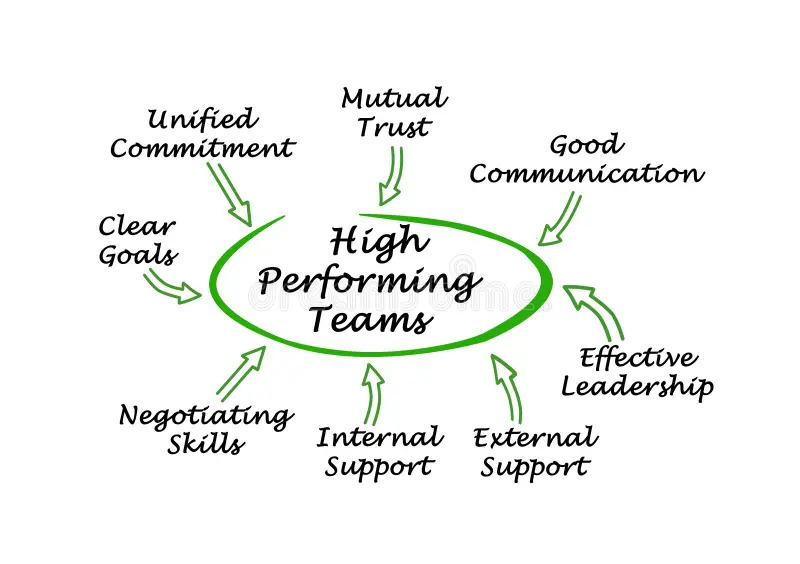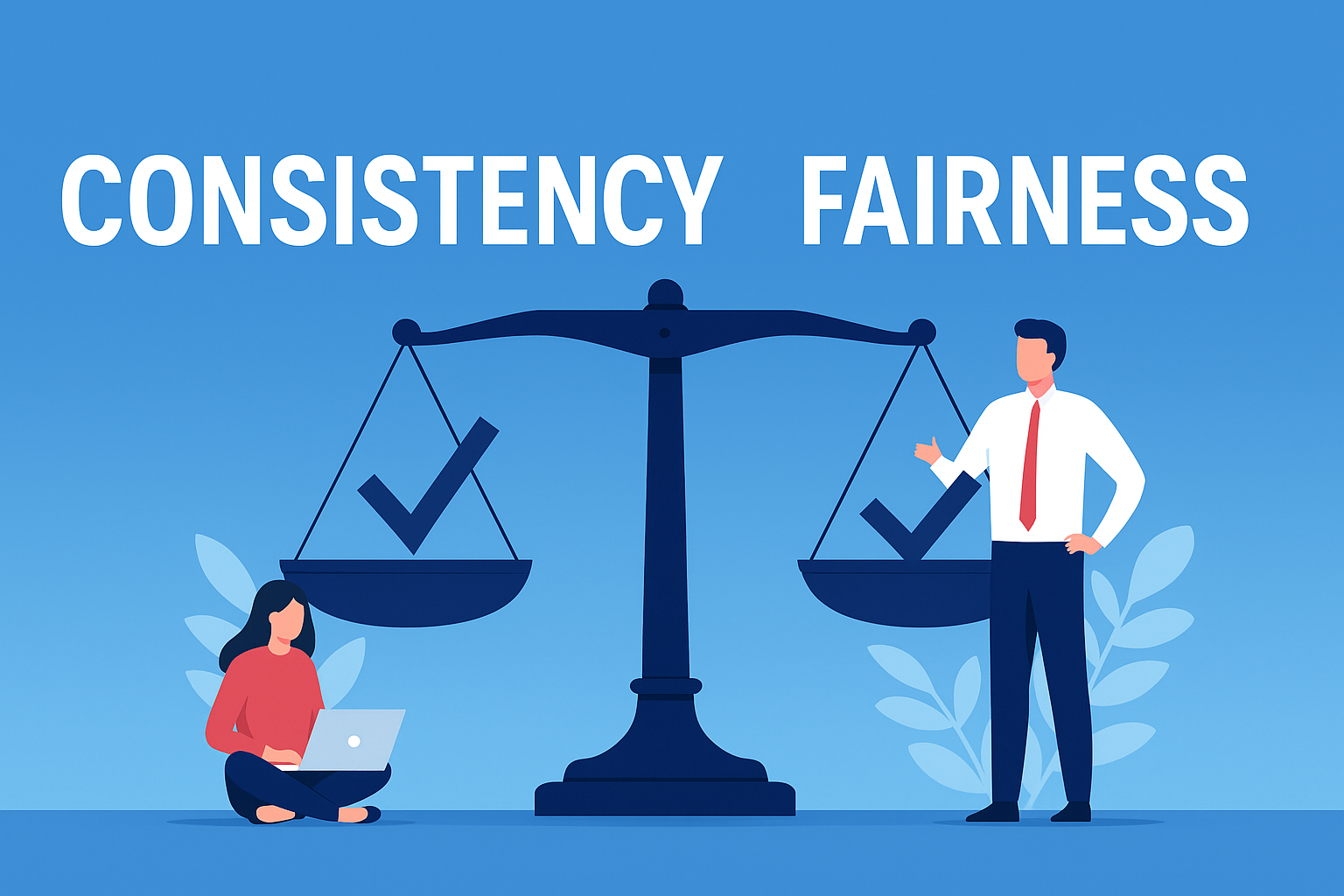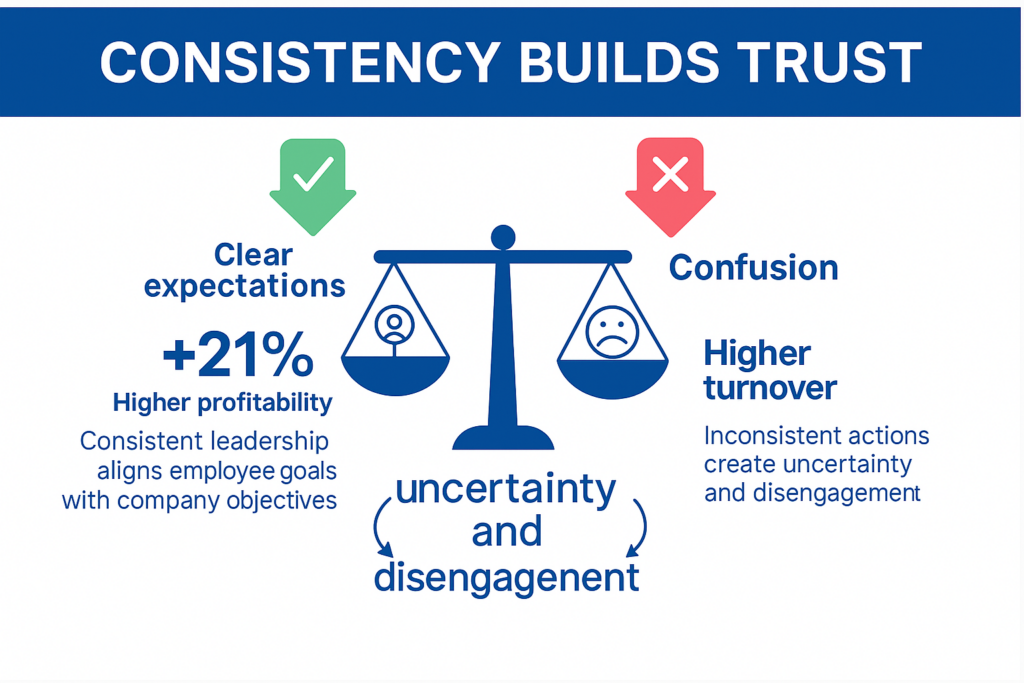Consistency and fairness are essential drivers of trust, engagement, and overall performance in any organization. When leaders fail to maintain these principles, the effects can be subtle but far-reaching, influencing everything from team morale to retention rates.
-
Consistency: The Cornerstone of Trust
When employees know what to expect from their leaders, they can focus on delivering results instead of navigating shifting priorities. For instance, a study by Gallup found that teams with highly engaged employees have 21% higher profitability and 17% higher productivity. This engagement often stems from consistent leadership that sets clear expectations and aligns them with company goals.
Inconsistent decision-making, on the other hand, leads to confusion and disengagement. A study by Harvard Business Review showed that inconsistency from leadership, whether it’s in enforcing policies or responding to performance issues, often leads to decreased employee motivation and higher turnover rates. This can be especially impactful in fast-paced environments where team members rely on clear direction to manage competing priorities.
-
Consistency: The Cornerstone of Trust
When employees know what to expect from their leaders, they can focus on delivering results instead of navigating shifting priorities. For instance, a study by Gallup found that teams with highly engaged employees have 21% higher profitability and 17% higher productivity. This engagement often stems from consistent leadership that sets clear expectations and aligns them with company goals.
Inconsistent decision-making, on the other hand, leads to confusion and disengagement. A study by Harvard Business Review showed that inconsistency from leadership, whether it’s in enforcing policies or responding to performance issues, often leads to decreased employee motivation and higher turnover rates. This can be especially impactful in fast-paced environments where team members rely on clear direction to manage competing priorities.
-
Fairness: The Secret Ingredient for Team Morale
Fair treatment is key to cultivating a high-performing team. Employees who feel they are being treated fairly are 2.5 times more likely to stay with their current employer, according to research by Gallup. Fairness is often tied to transparency and equity in decision-making, such as how promotions, raises, and recognition are distributed.
However, fairness doesn’t only impact retention—it also drives collaboration. When employees feel their contributions are valued equally, they’re more likely to work cohesively. For example, Salesforce has embedded fairness into its culture by using data-driven performance metrics and making its compensation process transparent, which has contributed to high engagement levels across its workforce.
On the contrary, when fairness is lacking, it can lead to burnout and resentment. For instance, in 2021, a McKinsey & Company report revealed that 42% of women of color in the workforce felt they had been treated unfairly, a significant driver behind the disparity in retention rates among different demographic groups.

-
The Ripple Effect of Inconsistency and Unfairness
Inequity and inconsistency in the workplace aren’t always glaringly obvious, but they can have a profound impact on the team’s dynamics and individual performance. Consider a situation where a manager consistently praises one employee for accomplishments that others have also achieved. While this may seem like a minor issue, it can lead to negative feelings of favoritism, undermining trust and collaboration within the team. In fact, research from Towers Watson found that employees who perceive favoritism in their workplace are 45% more likely to leave than those who feel they are treated fairly.
Even more subtle actions—such as uneven distribution of responsibilities or lack of clarity around expectations—can erode the psychological safety that is critical for high-performing teams. According to Google’s Project Aristotle, psychological safety, where team members feel safe to take risks and make mistakes, is one of the most important factors in team success. If employees feel they’re being treated inconsistently or unfairly, they’re less likely to feel comfortable speaking up or sharing new ideas.
-
How to Promote Consistency and Fairness in the Workplace
To mitigate the risks associated with inconsistency and unfairness, organizations can take several proactive steps:
-
Clear Policies and Communication
Having well-documented policies ensures that decisions are made consistently across the organization. For example, Microsoft has implemented transparent performance evaluation systems that help ensure fairness and consistency in promotions and compensation. Their use of clear benchmarks helps both managers and employees align their expectations.
-
Data-Driven Decisions
Using data to drive decisions ensures that promotions, raises, and performance reviews are based on measurable outcomes. IBM uses analytics in its HR processes to assess employee performance, ensuring that all employees are evaluated fairly and consistently based on objective metrics. This approach helps eliminate biases and increases employee satisfaction.
-
Regular Feedback Loops
Creating a culture of open, honest feedback ensures that any inconsistencies or concerns are addressed promptly. A continuous feedback culture, like the one implemented at Spotify, helps identify and correct potential fairness issues before they escalate. By regularly gathering feedback from employees and acting on it, leadership can foster a more transparent, inclusive work environment.
-
Leadership Development and Bias Training
To ensure leaders are fair and consistent in their actions, organizations should provide training focused on recognizing and mitigating biases. Accenture offers unconscious bias training as part of its leadership development program to help leaders make more equitable decisions, reducing the chances of favoritism or inconsistency.
Our Performance Acceleration Model is a 2 day leadership intervention that upskills managers is having better and higher quality conversation which underpins the entire performance system. It tackles upskilling gaps like giving immediate feedback, understanding biases and having different conversations based on employee needs. This is a really proactive way of managing performance.
The Bottom Line: Fairness and Consistency Drive Organizational Success
When consistency and fairness are embedded into an organization’s culture, employees are more likely to be engaged, motivated, and loyal. The positive effects of a fair and consistent workplace extend beyond just individual job satisfaction—they can also drive higher performance, greater innovation, and improved retention rates.
By setting clear expectations, relying on data-driven insights, and fostering a culture of fairness and accountability, organizations can build trust, increase engagement, and achieve long-term success.


